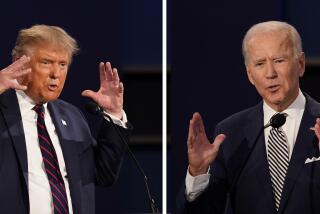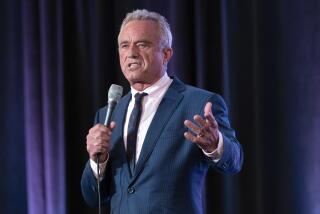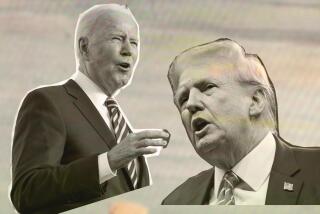Edwards Eager to Debate Rival Kerry
- Share via
ATLANTA — Like a hunter pursuing big game, Sen. John Edwards sought to flush front-runner Sen. John F. Kerry into the open Thursday by challenging him to a series of pre-Super Tuesday debates -- encounters that Edwards believes could help catapult his campaign into the lead for the Democratic presidential nomination.
The move marks Edwards’ emergence from a candidate scrambling for legitimacy to the last viable challenger to Kerry.
“It would be a real loss for our party if Sen. John Kerry and Sen. John Edwards didn’t debate right here in the state of Georgia,” Edwards told about 300 people gathered at the Atlanta University Center, reprising a statement he made at Columbia University in New York earlier in the day.
“We ought to debate wherever and whenever the state of Georgia and the people of Georgia want us to. This election is too important.... Everything that you and I believe is at stake.”
More than half a dozen debates are being planned in March 2 primary states -- including a Feb. 26 encounter sponsored by the Los Angeles Times and CNN. Both Edwards and Kerry have committed to the Los Angeles debate, as have Rep. Dennis J. Kucinich of Ohio and the Rev. Al Sharpton of New York.
Edwards has pledged to take part in as many others as his schedule allows.
His campaign said Thursday he was looking forward to the Times/CNN debate, but it has not committed the candidate to other forums.
“John Kerry has engaged in debates throughout the campaign -- he enjoys debating,” said Kerry spokesman David Wade. “We’re weighing our options as we run a national campaign.”
The last comment was a thinly veiled shot at Edwards, who has vowed to compete nationally but has written off a large number of early primary states. Next week, Democrats in Idaho, Utah and Hawaii will vote in their primaries, and Edwards will not compete actively in any of them.
Although Edwards said Thursday he wanted to debate Kerry, many scheduled forums will include Kucinich and Sharpton.
Neither has garnered more than 20% of the vote in any of the 17 contests so far. But Kucinich finished ahead of Edwards in Maine and Washington state and Sharpton finished ahead of Edwards in Washington, D.C.
“Our position is that it’s not for us to decide who’s to be eliminated from the debate,” Wade said.
In many ways, Edwards now has the campaign he has been shooting for since announcing his candidacy more than a year ago.
At the time, he was little known outside North and South Carolina, and had mapped out a strategy to survive early primaries, then build name recognition to emerge as the main challenger to the front-runner.
Now that the race has consolidated to two main rivals, Edwards faces a crucial challenge: He must win. Coming in second in primaries, as he did this week in Wisconsin, will no longer suffice.
“Edwards has to not just beat the point spread, not just get close to Kerry -- as he did in Iowa and Wisconsin -- he needs to beat him in multiple places and start winning large numbers of delegates,” said Charles Cook, a Washington, D.C.-based political analyst.
But Kerry could have too much of an advantage in money and momentum for Edwards, who has built a reputation as a persuasive campaigner, to catch up.
Kerry has won 15 of 17 primaries and holds commanding leads in polls in several March 2 primary states, including Georgia, New York, Ohio and Rhode Island.
So far, Edwards’ only primary win was in his native South Carolina.
“He needs to show that he truly is a national candidate,” said analyst Earl Black at Rice University in Houston. “Wisconsin is the only northern state where he made a close race of it.” Edwards would need to win Georgia and a northern state to show he is more than a regional candidate.
His best shot, Black said, would be Ohio, which might be receptive to Edwards’ message about jobs and trade policy. Kerry, though, on Thursday picked up the endorsement of the AFL-CIO, a key ally in union-heavy urban areas such as Cleveland and Columbus.
If Edwards survives March 2, the calendar tilts his way geographically with primaries March 9 in Florida, Louisiana, Mississippi and Texas.
But it takes money to compete. Overall, the campaign has raised $4.9 million since the Iowa caucuses, including $250,000 from two fundraisers Wednesday in New Jersey. And he’s trying to raise more -- Edwards flew to Miami to collect more checks from donors Thursday night.
In cash flow, however, Edwards lags Kerry, who has raised about $7 million since the Iowa caucuses.
Although Edwards does not plan to air many television ads before March 2, he is traveling extensively in key states. Thursday he was in New York, Georgia and Florida. Today he was scheduled to be in Georgia, Maryland and New York.
On Saturday, he has events scheduled for Ohio and New York.
“What we found out in the last few weeks is that the pundits and the pollsters don’t know everything, do they?” Edwards said here Thursday, adding that 75% of the delegates to the Democratic nominating convention have yet to be selected.
“The voters have said to us they want this campaign to continue.... They want to hear this debate.”
The core of Edwards’ speech remained true to form, blasting the Republican administration for policies that Edwards believes have led to large-scale erosion of American jobs and in the nation’s image abroad.
Yet Edwards stepped back from an earlier tack of drawing distinctions between Kerry and himself on trade and other issues. He focused instead on the Bush White House. Casting trade issues and Wall Street scandals in moral terms, Edwards argued that trade and tax policies that enabled corporations to focus on profits over workers was wrong.
“This is more than an economic issue,” Edwards said. “This is about more than fair trade. This is a moral issue. It’s about what we believe in as a nation.”
Times staff writer Maria L. La Ganga contributed to this report.
More to Read
Get the L.A. Times Politics newsletter
Deeply reported insights into legislation, politics and policy from Sacramento, Washington and beyond. In your inbox twice per week.
You may occasionally receive promotional content from the Los Angeles Times.










